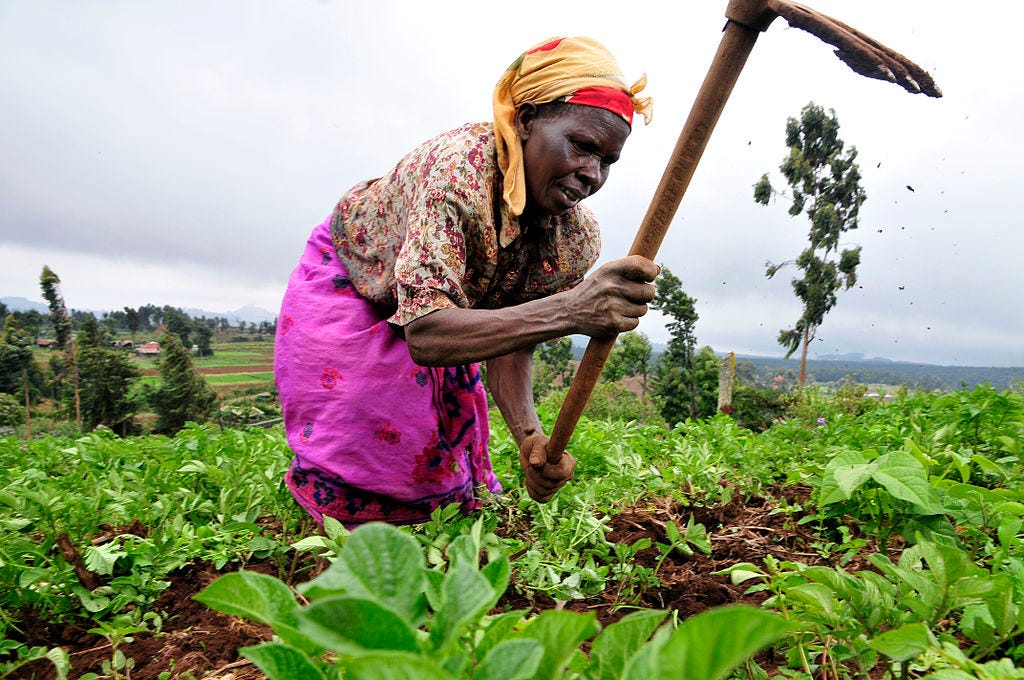3 September 2021. Food | Luck
Seven things to sort out the world food system; it’s not just people who need luck. Societies do too.
Welcome to Just Two Things, which I try to publish daily, five days a week. Some links may also appear on my blog from time to time. Links to the main articles are in cross-heads as well as the story.
#1: Sorting out the world food system
The UN’s Food Systems Summit is coming up soon—it’s only the sixth food summit the UN has held in 70 years, and we’re starting to see the kinds of articles that position perspectives before the event.
One such was published this week in Nature by a group of scientists, identifying seven priorities that also reflect the scientific evidence base.
(Photo by Neil Palmer (CIAT). A farmer at work in Kenya's Mount Kenya region. CC BY-SA 2.0)
I’m short of time today, so I’m just going to list their seven headings and quote their action agenda.
Their seven priorities are:
1. “End hunger and improve diets. Scientists need to identify optimal conditions and opportunities for investments to make healthy and nutritious foods more available, affordable and accessible. Measures that jointly improve more than one of these are most effective...
2. “De-risk food systems. The more global, dynamic and complex food systems become, the more open they are to new risks. Scientists need to improve how they understand, monitor, analyse and communicate such vulnerabilities...
3. “Protect equality and rights. Poverty and inequalities associated with gender, ethnicity and age restrict many people’s access to healthy foods. Socio-economic researchers need to suggest inclusive ways to transform the more than 400 million smallholder farms worldwide...
4. “ Boost bioscience. Researchers need to find ways to restore soil health and improve the efficiency of cropping, crop breeding and recarbonizing the soil and biosphere. Linkages among all Earth systems must be considered together — known as a One Health approach...
5. “Protect resources. Tools are needed to help people to manage soils, land and water sustainably. For example, hand-held digital devices and remote sensing can track concentrations of soil carbon and other nutrients. Artificial-intelligence systems and drones allow farmers to spot areas that need irrigation, fertilization and protection from pests. ...
6. “Sustain aquatic foods. Most of the focus on food so far has been on soil-based agriculture. Fish, shellfish and aquatic plants such as seaweed have much to offer nutritionally and environmentally...
7. “Harness digital technology. Robots, sensors and artificial intelligence are increasingly used on farms: to harvest crops and milk cows, for example. Sensors can monitor the origin and quality of ingredients and products along the food-processing chain to reduce losses and guarantee food safety. But most farmers and producers still don’t have access.“
They have three headlines on the areas of focus that they think will make a difference. These are:
- Boost finance—a lot. They suggest that food related research should get 1% of the money spend on food in any fiven economy.
- Increase scientific capacity. They want some of the food research fund to go into a special fund that focuses on increasing research capacity in low- and middle-income countries, and want to see more expand research collaborations between the public and private sectors.
- They also identify a need to strengthen the interface between science and policy. Surprisingly to me, agriculture, food security and nutrition do not have an international agreement or convention to consolidate actions. It’s surely time to create such a thing.
#2: It’s not just people who need luck. Societies do too.
Ed Smith’s book Luck (2012), which I finished recently, takes a while to move out of third gear. But the final third is fascinating.
Smith is a former elite sportsman (he played Test cricket for England) who now works as a journalist.
So his reflection on the role of luck in making sports interesting for the spectator is worth some attention. He notes the Woody Allen film in which a tennis ball is poised on the netcord, and could drop either way. But, in practice, it’s unlikely to makes a difference.
A tennis match is played out over hundreds of points, and while there a days when players beat their ratings, they’re unlikely just to get lucky. Basketball, similarly; lots of score mean that it’s hard to get lucky.
But in football, where it hard to score a goal and a goal either way often decides the outcome, luck plays its part. Not over a season, where, as the cliche has it the table doesn’t lie, but certainly over the course of a single match. So it’s a better deal for spectators.
Smith tells the story of the Kent cricket team he played for which decided to stop blaming bad luck when things went against them. The intention was to produce a more competitive attitude. The result was terrible. Sometimes you are unlucky in cricket, but the player on the wrong end of misfortune had no way to say that.. But even if it was a bad shot that had done for them, there was no way to ameliorate the disappointment.
And what was true for a sports team is also true for societies. The book comes alive when he gets into anthropology. The world of the Azande, who had no word for luck,
was characterized by mistrust, suspicion and jealousy between neighbours. No one ever simply died in Zandeland. Someone was always to blame (p228)
Similarly for the Dubuan people of Papua New Guinea:
In the absence of luck, it is impossible that anyone can ever be struck by lightning without an enemy having willed it out of envy. A neighbour’s harvest can only be better than yours due to black magic (p229).
But, as Smith says, our modern language about ‘agency’ doesn’t help either. In its way that’s also a pretence that luck doesn’t matter:
We tend to consider the growth of ‘agency’—the opposite of blind luck—to be synonymous with the progress of human civilization. But the lessons of sociology and anthropology suggest we shouldn’t interpret words like luck, fortune and chance as signs of backwardness. In fact, we should be more worried when we stop believing in luck.
And in fact we know that the successful always have some luck (and sometimes some privilege) to help them along, while people who don’t succeed are often assailed by bad luck. (I wrote a Just Two Things on an article in Aeon on this subject a few months ago).
In a complex, emergent world, an individual can never act with reasonable knowledge of all the possible outcomes. Bad luck is always going to strike somewhere. It’s better to accept this—and have a forgiving safety net to catch people.
One of the reasons I’m short of Time today is that I’m about to go on holiday. So there’s also going to be a reduced schedule over the next couple of weeks—probably two to three editions per week. I’ve got lots of thing ready to be written about, but don’t know what my time and bandwidth will be like.
j2t#161
If you are enjoying Just Two Things, please do send it on to a friend or colleague.




